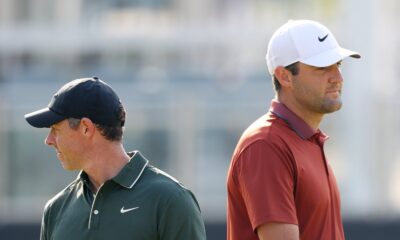PHIL GILES, THE Brentford director of football, describes himself as calm, dispassionate, analytical, emotionless and introverted.
Maybe these are some of the traits that have been needed to help him maintain an even keel in the job over the last 10 years.
A decade in the football industry would be enough to test any person’s sense of self.
And that’s before you consider that Giles is a Geordie from Gosforth who had a Newcastle United season ticket growing up.
He has a PhD in applied mathematics and began working with Brentford after a chance encounter on a London tube platform with a colleague who worked in one of owner Matthew Benham’s other businesses.
When Giles talks about how he works you listen because his manner is respectful, absorbing and thoughtful.
“You need to be calm at all times, patient and not emotional and sort of dig into, you know, facts and evidence rather than just sort of giving opinions and feelings,” he says.
“Because we all have opinions and feelings on the game, but actually, you know, trying to oversee a club and, manage to change things or evolve it or make it better, it’s got to be based on some evidence, I think.”
Giles has left his office and walked past the first team training session taking place on the day before the 3-1 win over Manchester United.
He takes a seat with The 42 as planes from nearby Heathrow Airport fly directly overhead at regular intervals.
This is Brentford’s fifth successive season in the Premier League and, despite a summer of upheaval, he is adamant the foundations are in place for the west London club to avoid a relegation battle and possibly even challenge for a European place – they’ve finished 13th, 9th, 6th and 10th so far.
“Are we a top side who are going to challenge at the top of the table? Probably not. I don’t see any reason why we would be anywhere near the bottom, and again, if we can get it right, two of the four seasons we’ve been in the Premier League we’ve kind of nibbled on the European places,” Giles says. “And not quite got there. If we could be in that mix again that would be nice.
“But I try not to set targets in terms of league position, it’s more setting targets for performances and then doing what we said we’d do in terms of improving the team, whether that be by coaching or recruitment. And then letting the performances come and results even out over a period of time.”
Giles describes Bournemouth and Brighton as two clubs that are role models. The latter are embarking on their eighth successive campaign in the top flight but suggesting what it takes to become settled in the Premier League seems to be the only thing that makes Giles bristle.
“You’re never established. There is no such thing as established. It’s not even a football word. When are we established? Probably never. Not a club our size, I don’t think you can ever take it for granted. What does that mean? It doesn’t mean anything.
“What you can say is you look at the squad and we’ve got enough good players to have a good season. After that it will be a bit of randomness in terms of injuries, not [getting] injuries, runs of results where a bounce of the ball… A bit of luck, no luck, and that will dictate where you finish exactly.”
Giles would have celebrated yesterday’s 3-1 win over United but, speaking on the eve of that game while head coach Keith Andrews put the players through their paces in the final training session to prepare, he explained that results do not define his weekends.
At the start of this season, for example, one of the primary areas for improvement was to reduce the number of shots that Brentford conceded on their own goal.
They also ear marked off the ball defensive work and transitional play as core targets.
“So, let’s just take the underlying metrics and adding value. Obviously, there’s many different metrics you can take from a football match or from a season,” he says.
“First thing you’ve got to identify is how are you trying to play and where do you want to be good? So really it’s a question of, in terms of the head coach adding value to that, it’s about sitting at the start of the season and saying what does good look like for us in this phase of play and making sure that the coaching and what we’re doing now is aligned.”
Giles explains that these metrics are tracked and assessed to ensure they meet expectations.
Brentford are happy to sacrifice possession but not remain on the back foot in terms of their defensive approach and capability to counter, or pose a threat with long throws and set-pieces.
“We’re very good in some of the areas that we’re identifying,” he says.
“Try and strip out all the good luck and bad luck elements and just look at are we playing well or are we not playing well? So, for me, success this season is first of all improving the bits we identified improving on at the start of the season.
“Second measure of success is in terms of your league position, obviously that can be a bit random at times.”
When Giles praises Brighton, he does so in the context of them staying ahead of the curve with their recruitment, seemingly always having a ready made replacement for their latest big money sale.
“As long as you’re doing that you’ve got every chance of being successful,” he says.
This summer, Brentford sold their captain, Christian Nørgaard, to Arsenal, Yoane Wissa eventually ended up at Newcastle United, and Bryan Mbuemo was a club-record sale to Old Trafford for around €80 million.
Giles points out that they brought 23-year-old Dango Ouattara to the club from Bournemouth for a club record €50m fee. “We’re not talking about a child coming in, he’s a decent Premier League player but also with potential. Would you expect him to do what Bryan [Mbuemo] did last year and score 20 goals? Is the expectation for him to do that? Maybe not, but then he’s two or three years behind Bryan, so where could he be in two or three years’ time? I’m certain he could be just as effective as Bryan.”
Ukrainian midfielder Yehor Yarmolyuk, still only 21, has already stepped up this season to fill the void left by Nørgaard while striker Igor Thiago, who joined last season for €38m but missed it through injury, scored twice yesterday.
“It’s important to know what you’ve lost but not dwell on that and appreciate the players who have come in to a really good level,” Giles says, citing how Nathan Collins was the obvious choice to become captain and that Caoimhín Kelleher has not yet reached his potential after joining from Liverpool.
“Over the next two, three years you will see him really, really become excellent. He’s already a No.1 Premier League goalkeeper but he can become a really top goalkeeper over time. He’s done really well, we love him. He will be great.”
And then you consider the change in the dugout. Giles and former head coach Thomas Frank had worked together for most of the last decade and had a relationship that required no fine tuning.
Once it became clear that the Dane would be departing for Tottenham Hotspur, the search was on for his successor.
The 42 reported on elements of that process during the summer, one which led to Andrews being promoted from set-piece coach to the main job, his first head-coach position in a coaching career that began while still a player at the age of 29.
Giles says there are always “knowns and unknowns” during any recruitment process but Andrews’ appointment brought a level of clarity that provided comfort for the season ahead.
“For me he was like the perfect candidate because there was so many things we knew already going into it because he’d been here, I mean a year is still quite a long time in football, right, so you get to know a lot a lot about a person, so it made perfect sense from that point of view, even if he’s not been a head coach and we know how he’s done that role in the past.
“He’s got, I have no doubt, his personality and character is set up well for that particular role. His knowledge of the game is set up well for that role and obviously he’ll get huge support from us in terms of making it a success as well.
“I think Keith is very thoughtful about the game. I think he’s got a deep understanding of it and what he wants to achieve. I think he’s very, very good at getting around people and getting close to them. That’s important, especially around players and communicating well with them and getting close to them and understanding them at a human level.
“What I want to see in a head coach is that nice balance of personality across different traits at different times. I definitely think he’s got that, that ability to interact in different scenarios and different ways with people.”
Belief and trust has been steadfast within the club from day one, and more days like yesterday should convince those on the outside of the plans that have been put in place.













